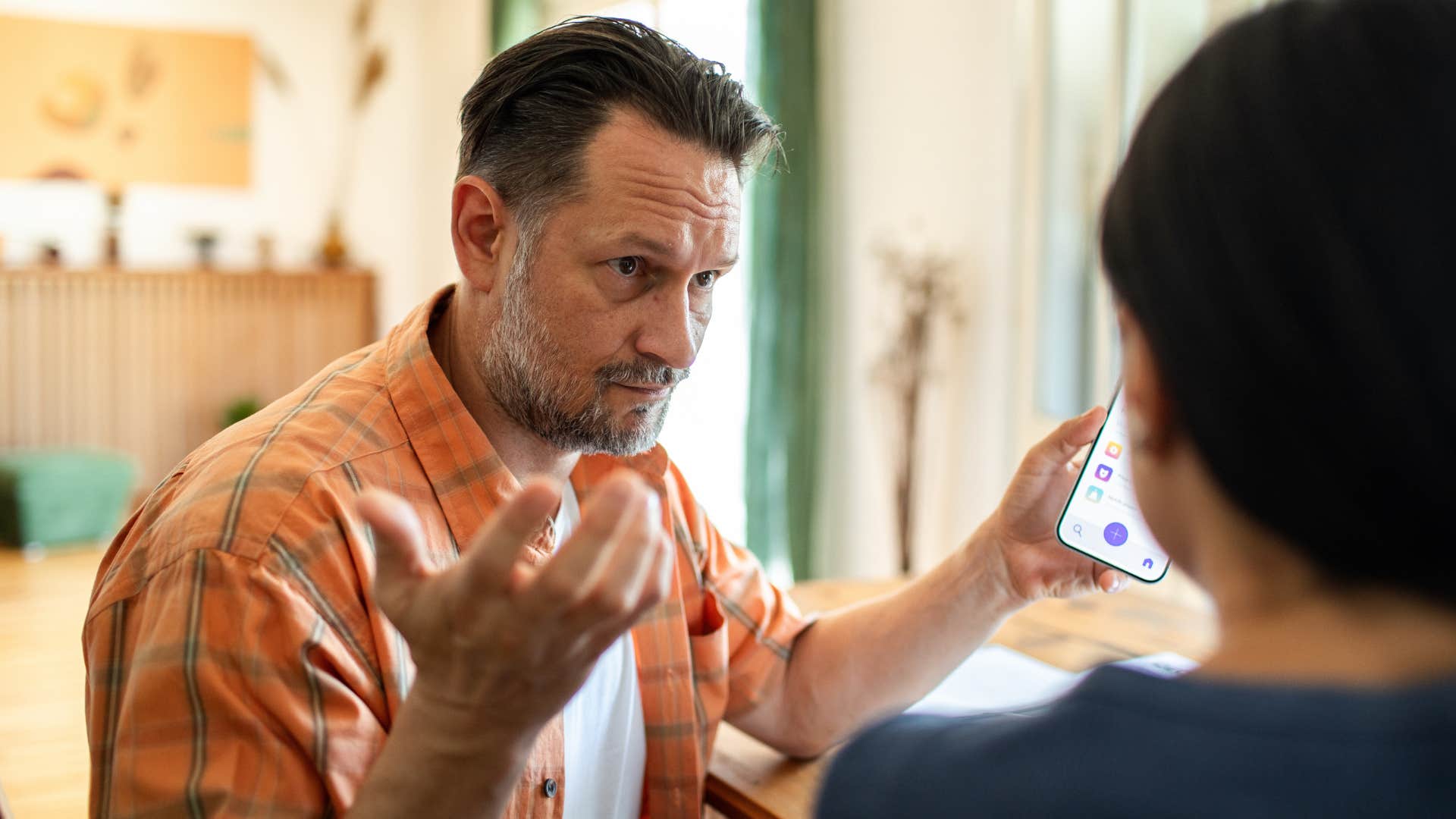10 Traits Of An Emotionally Stunted Man Who Avoids Responsibility
Not only does immaturity stunt personal development, it negatively impacts the potential for healthy relationships.
 Andrii Nekrasov | Shutterstock.com
Andrii Nekrasov | Shutterstock.com Without foundational experiences that teach them healthy coping mechanisms and empathy, in adulthood many men resort to frustration and anger when they’re expected to take accountability for their actions or express their emotions in an uncomfortable conversation. Clinical social worker Assael Romanelli,PhD explains that many men struggle with emotional maturity in adulthood due to the societal norms, pressures, and relationship expectations that made them feel detached and disconnected from their emotions earlier in life.
Of course, there are many specific traits of an emotionally stunted man who avoids responsibility, but it’s not everyone — with the right role models, self perseverance, and vulnerability, it’s possible to grow into an emotionally intelligent person, despite the circumstances.
Here are 10 traits of an emotionally stunted man who avoids responsibility
1. They’re unreliable
 simona pilolla 2 | Shutterstock.com
simona pilolla 2 | Shutterstock.com
Not only do immature men, who struggle both with emotional intelligence and healthy relationships, struggle to keep promises with the people in their lives, they struggle to keep commitments. With an aura of self-centeredness, they’re less concerned with appeasing other people — whether it’s showing up on time or canceling at the last minute — and more vigilant about their own self-interests and motivations.
According to psychologist Sabrina Romanoff, it’s not just immature men that’ve been negatively affected by unmet needs or childhood trauma, it’s also the partners that “choose” to remain in their lives and accept their lack of accountability and constant disrespect. As explained in the book “Daughters of Divorce,” many people are stuck in the pursuit of love, respect, and validation, similar to the one they were forced into with emotionally unavailable parents, in their adult relationships.
If you’re constantly choosing partners who embody the traits of an emotionally stunted man who avoids responsibility, don’t waste energy trying to change him or help him grow up, focus on protecting your energy, healing your unresolved trauma, and setting productive boundaries in those relationships.
2. They shift blame to others
 Dragon Images | Shutterstock.com
Dragon Images | Shutterstock.com
It’s not just responsibility that many emotionally stunted men avoid in adulthood, it’s also accountability. They struggle with the uncomfortable emotions attached to being called out or owning up to being wrong, so they get defensive to protect themselves from embarrassment, envy, and shame. Unfortunately, that inability to cope with big emotions tends to harm the relationships in their lives, especially as the high stakes of connections grow into adulthood.
If your partner can’t have an open conversation about their emotions with you, how can you expect them to support you during more tumultuous times riddled with loss, grief, betrayal, or sickness? It’s not just immaturity, it’s a constant decision many adult men make: self-preservation over vulnerability.
3. They struggle with commitment
 Geber86 | Shutterstock.com
Geber86 | Shutterstock.com
From getting groceries to settling down with a long-term partner, emotionally stunted men struggle with making decisions and having the kind of self-assuredness that keeps them committed. They operate from a place of insecurity — afraid of being wrong and fearful of getting hurt and looking weak in their vulnerability.
This is what keeps them from taking on responsibilities in adulthood and truly evolving — they’re afraid of everything that’s not innately comfortable. Research from the Newport Institute even suggests that adult men who struggle to maintain healthy romantic and platonic relationships lean on their parents for much longer, living at home well into their adulthood.
4. They avoid talking about the future
 Lightfield Studios | Shutterstock.com
Lightfield Studios | Shutterstock.com
While many emotionally immature people tend to rely on attention-seeking behaviors and external validation to misguidedly build their self-esteem, most will avoid talking about personal achievements and future plans — not just because they don’t have many, but because they’re not looking to open up debate that would spark more responsibility in their lives.
If they can shift the blame to their parents or their circumstances to avoid taking on additional responsibilities, they’ll do it. If they feel like making other people feel guilty or embarrassed will help them look better, they’re going to adopt that narcissistic tendency. Anything they can do to feel more comfortable and secure in their own identity, they’re willing to sacrifice for that feeling.
5. They’re not empathetic
 Voronaman | Shutterstock.com
Voronaman | Shutterstock.com
Emotional maturity can be boiled down to empathy. According to a study published in “Acta Biomedica,” successful empathetic people are not only in touch with and cognizant of other people’s emotions, but also their own. As one of the most influential traits of an emotionally stunted man who avoids responsibility, not having empathy impacts every part of a person’s life — from relationships to work life to personal development.
If you can’t pinpoint, explain, and validate your own emotions, you’re never going to be able to maintain a healthy relationship founded on communication, trust, honesty, and balance.
6. They’re impulsive
 garetsworkshop | Shutterstock.com
garetsworkshop | Shutterstock.com
According to psychologist Dr. Thomas Plante, narcissism has become a more common personality trait in recent years, encouraging many people to mistakenly victimize themselves, avoid responsibility, and shift blame to other people in their lives. By avoiding their own responsibilities and the possibility of any new ones — from work to relationships to financial burdens — they can comfortably push away their anxieties about adulthood.
This manifests itself as impulsivity and irresponsible behavior in many adult men’s lives, from spending erratically to isolating themselves over a new all-encompassing hobby or running away from problems by booking a trip or investing time into a new fling.
7. They procrastinate
 Lightfield Studios | Shutterstock.com
Lightfield Studios | Shutterstock.com
Fueled by anxiety and inner turmoil, many emotionally stunted men who avoid responsibility prefer to push responsibilities they do have to the background of their lives rather than addressing and completing them directly. This tendency towards avoidance not only builds resentment in relationships, but it also tends to keep the procrastinator comfortable with not taking action, according to a report from Mass General Brigham McLean.
Held to such extreme male standards and expectations growing up, many emotionally immature adult men are still intrinsically driven by perfectionist protector attitudes, keeping them from trying anything new or doing anything they’re worried they’ll fail at.
8. They’re emotionally detached
 Pheelings media | Shutterstock.com
Pheelings media | Shutterstock.com
According to clinical psychologist Matt Boland, emotional detachment isn’t only a problem for an individual's psychological well-being, it’s also ingrained into our social experiences, physical well-being, and personal development. Many emotionally stunted men never learned how to get in touch with their own emotions, isolating themselves before they had a chance to connect with others over shared experiences or vulnerabilities.
Whether it’s rooted in misguided societal expectations or unresolved childhood trauma, this emotional detachment and disconnect from other people and experiences in their life fuels inner turmoil, oftentimes without knowing exactly why.
9. They’re always in a defensive mode
 Fizkes | Shutterstock.com
Fizkes | Shutterstock.com
People who struggle with emotional regulation may view vulnerability and uncomfortable emotions as a sign of weakness. They’d prefer to maintain a rigid persona rooted in misguided superiority than seem “weak.”
Outside of playing defense against their internal emotions, many men who avoid responsibility will shift blame and victimize themselves in their relationships to avoid taking accountability for their actions and mistakes.
These men aren't solution-oriented or supportive — not because they don’t care about their partners, but because they’re more concerned with their own image than anyone else’s.
10. They struggle to learn from their mistakes
 WBMUL | Shutterstock.com
WBMUL | Shutterstock.com
An emotionally mature man is open to suggestions, growth, and personal development, even in a committed relationship. Even in situations where they don’t agree with advice or the experience of someone in their life, they’re willing to listen, take feedback, and empathize with their emotions before getting defensive.
Anyone who fails to take responsibility for their actions, grow from their mistakes, and take genuine advice from people in their lives isn’t capable of maintaining a healthy relationship. We’re all changing, evolving, and deserving of grace — we should be striving to be better and grow, even if it’s uncomfortable.
Zayda Slabbekoorn is a staff writer with a bachelor’s degree in social relations & policy and gender studies who focuses on psychology, relationships, self-help, and human interest stories.
